Big Week for the Lotteries
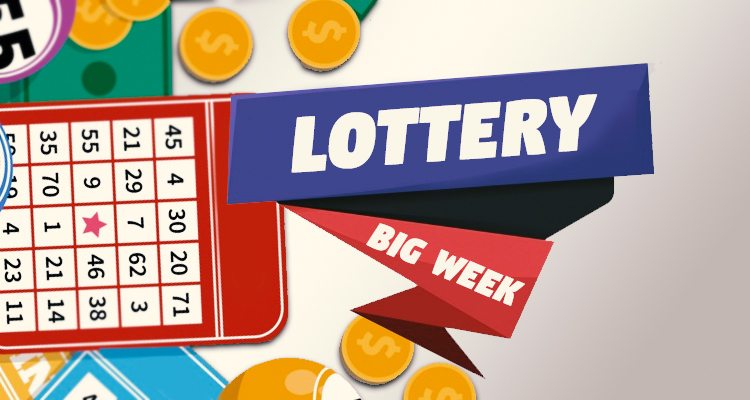
Brandon James 09:09 Oct 29th, 2018 Lottery
For anyone who hasn't been living under a rock the last few weeks, you're most certainly aware that the Mega Millions hit its record number prior to being hit on Tuesday, October 23rd, 2018. While this was advertised pretty widely as a 1.6 Billion dollar jackpot, that's actually not the case, as it came in at 1.537B.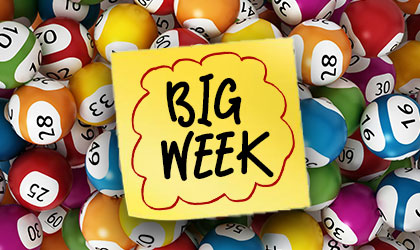
The winning ticket was sold in the town of Simpsonville, South Carolina, which is located in the Northwest part of the state, according to CBS News.
The world record jackpot, which this would have been had it been for the (heavily) rounded up number of 1.6B, was a Powerball win of 1.586B, which remains the biggest lottery award in history. There was recently a chance it could get that high again, as it jumps exponentially if the drawing nearest the billions mark misses, but it was hit on Saturday, October 27th, 2018 in the amount of 687.8M, according to CNN.
Interestingly enough, that Powerball jackpot represents the fourth biggest lottery win in world history, so we have seen the second and fourth highest historical lottery wins in the same week. It's very difficult to say whether or not such a thing will happen again.
A Perfect Storm
Two major factors came into not just the near-record jackpots, but also the fact that they came so close together.
Starting with the Mega Millions, it should be understood that the Mega Millions (prior to the October hit) was last hit on July 24, 2018, for 543M._1541154872329.jpg)
Which is now the eleventh (after last night's Powerball hit) largest jackpot in history, having previously been the tenth. The amount of the jackpot had nothing to do with the amount of this jackpot, but what did have something to do with it was the just under three full months it went without hitting.
While there is a very good chance the Powerball would have hit (which it did) before ever becoming this high, it had not been hit since a 245.6M jackpot on August 11th, 2018. Furthermore, the focus in the weeks leading up to it had been on the Mega Millions Jackpot, so the Powerball might not have gone up as fast as it otherwise could have. On the other hand, there may have been something of a, “Spillover,” effect as some people may have hedged their Mega Millions purchases with a Powerball ticket.
Harder To Win
Another directly related factor is the fact that Mega Millions changed the jackpot odds on October, 28, 2017...and not to make it easier to hit. Here is a quick look at the changes to the Mega Millions jackpot:
- September 6, 1996 odds to win 1:52,969,000
- January 13, 1999 odds to win 1:76,275,360
- May 15, 2002 52 odds to win 1:135,145,920
- June 22, 2005 56 odds to win 1:175,711,536
- October 19, 2013 odds to win 1:258,890,850
- October 28, 2017 odds to win 1:302,575,350
In order to win, one must currently hit 5/5 white balls (out of 70) and 1/25 Mega Balls. Once this combination has been achieved, you are a winner. That made it slightly harder than the formula that had been in place since October 19th, 2013 in which a player had to hit 5/5 (out of 75) white balls and 1/15 Mega Balls. Even though there are fewer white balls now, that is counterbalanced by the increase in ten Mega Balls.
Ticket Price Doubled
Another reason for the jackpot to hit these levels is that the price of a Mega Millions ticket was changed from $1 to $2 at this time. As you can see in this USA Today article.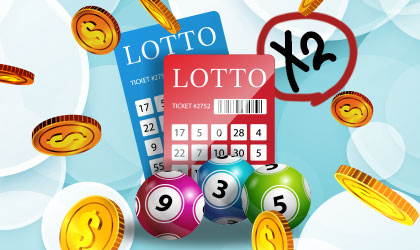
As a result, more money from each missed ticket goes into the top jackpot. Therefore, you don't need to sell as many tickets to get to this big time jackpot level as you once may have needed. This actually kind of makes sense for the lottery as long as it doesn't hurt sales too badly because it helps offset the fixed costs of the physical implements (paper for tickets, lottery machines) needed to deliver the game. Simply put: The lottery makes more money.
To their credit, they did buff the base jackpot from 15M up to 40M when making these changes. Also, because there are only 70 white balls instead of 75, (and you have to match five white balls without the Mega Ball to win a million) that has actually become easier to do. Therefore, over the long run and assuming the same number of full play $21 tickets purchased, there will be more $1,000,000 winners.
Just the Jackpot
Finally, in seventeen states as well as Washington D.C., players have the opportunity to avail themselves of a, “Just the Jackpot,” option. The way this works is that the player must pay $3, but instead of one ticket, the player gets two tickets that each has the opportunity to win the top prize, but no other prizes.
The, “Just the Jackpot,” option as well as the increase in price of tickets to begin with were more than enough to result in this (nearly) record lottery jackpot prize. While it did go a pretty good length of time prior to hitting, that was by no means anywhere near a record. As recently as 2017, specifically from April 28th, 2017 to August 11th, 2017, it had gone a longer period of time without hitting. However, that was under the old rules, (and prices) so the jackpot didn't even make it up to 400M.
Powerball Rule Unchanged
The Powerball, on the other hand, hasn't changed since October of 2015. The rules and prices have been the same for years. It actually went a fairly long-time without hitting by its standards.
Rather than piggybacking the Mega Millions to some sales, it looks like the Mega Millions jackpot actually may have hurt it (prior to being hit) because it actually went longer this time (78 days) than it did between November 4, 2015 and January 13, 2016 (71 days) and that is when the Powerball hit for the official record lottery jackpot of 1.586B.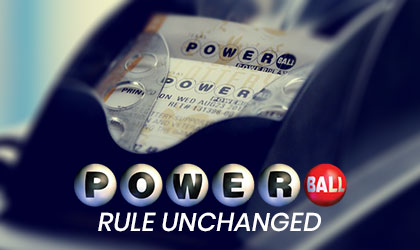
Interestingly enough, the Mega Millions also did not hit during that period, essentially, but the Powerball had an inherently faster-moving jackpot due to its rules, the starting jackpot amount, (it was 40M at this time and still is) and the fact that tickets for Powerball were $2 even at this time. Also, the Powerball had hit slightly less recently, which gave it a chance to build a little bit.
Therefore, the fact that the highest Mega Millions jackpot (second-highest overall in lottery history) and the third-highest Powerball jackpot (fourth-highest in lottery history) coming so close together was basically just a coincidence, nothing more or less. Again, it could arguably be said that the Powerball jackpot would have been even higher had it not been for the Mega Millions going up the way it did at roughly the same time. There are plenty of lottery players who are not loyal to any one game (why would you be?) but just look and buy a ticket for whichever is greater as they are usually advertised together.
I will admit to being a little annoyed at the way that the jackpot was advertised, because I saw billboards, store neon signs, little signs in the store etc. etc. and all of them said, “1.6B,” or, “1.6 Billion.” I didn't play it anyway, much less win, but I find it frustrating that they would imply that a record lottery jackpot was to be set only for it to fall considerably short. I understand 1.537 rounds up to 1.6B, but if you were a corporate accountant and did that without making it very clear that you were rounding 63 million or so dollars up, you'd probably be out of a job.
Lottery History
Lottery history was still made with this jackpot in one regard. That record-jackpot Powerball ticket was not one ticket, rather, it was three. In other words, three winners chopped that 1.586 Billion dollar jackpot to the tune of about 300-something million cash value. This Mega Millions winner, when he/she presents himself/herself, (this person can choose to remain anonymous, but we will know if it was claimed) will be splitting just under 900M one way.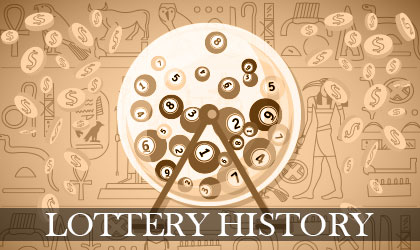
In terms of cash value per ticket, the three Powerball winners of the biggest lottery prize in history don't even crack the top five. Of course, all three of them received over 300M dollars, so I'm sure they don't mind me saying that.
With that, let's take a look at our new Top Ten highest prizes for overall prize in lottery history:
|
Date |
Type |
Amount |
|
January 13, 2016 |
Powerball |
1.5865B |
|
October 23, 2018 |
Mega Millions |
1.537B |
|
August 23, 2017 |
Powerball |
758.7M |
|
October 27, 2018 |
Powerball |
687.8M |
|
March 30, 2012 |
Mega Millions |
656M |
|
December 17, 2013 |
Mega Millions |
648M |
|
May 18, 2013 |
Powerball |
590.5M |
|
November 28, 2012 |
Powerball |
587.5M |
|
February 11, 2015 |
Powerball |
564.1M |
|
January 6, 2018 |
Powerball |
559.7M |
Hopping on the Hype Train
I think that the average lottery player (because to be sure, on average, they lose A LOT of money) is probably better off that the Powerball record held. It seems pretty consistent that every time a new record is set, and it's one game as opposed to the other, the rules change within a fairly short period to drive up the jackpots on the game that didn't set the record or near record.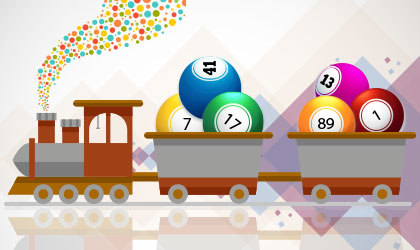
If you look at that Powerball jackpot, for example, that hit in January of 2016. After that, the Powerball then came in and hit what was then the second-highest lottery jackpot (and still second-highest for Powerball) with 758.7M on August 23, 2017. Just after that time, Mega Millions changed the rules. It had held the title of the highest jackpot for over three and a half years, just to get beaten twice in about a year and a half.
During this stretch, the Mega Millions would eclipse half a billion once, in July of 2016, and then it would never see 400M, or more, again until after the rule change. Meanwhile, the Powerball would get above 400M routinely. Specifically, the Powerball would touch over 400M five times just between January 13th 2016 (the record) and October of 2017. (when Mega Millions changed the rules)
The fact of the matter is that hype sells tickets, as well as overstatement of the case.
Here's an example from the retail world: Why does everything end in ninety-nine cents? The answer is pretty simple:
If you have a grocery item that costs $4.99, you can say, “Hey, it's less than five bucks.”
If you have a piece of furniture in a furniture store that costs $999.99, “Hey, it's under a thousand bucks.”
Even hotel rooms when I worked in a hotel, give the customer a price of $99.99, “Hey, I've got decent rooms, big screen TV's, microwave, refrigerator and I can get you one for under a hundred bucks.”
The lottery works the same way in the sense that big jackpots beget bigger jackpots. In this area, Mega Millions and Powerball both have their big flashy billboards near the highway, and a little neon sign advertising the jackpots in just about every gas station that sells the things, but you never really hear about it until the jackpot, “Gets good.”
You're not just pimping a penny like you do with product costs, you're pimping millions. When that jackpot gets over 400M, clickbait articles, news stations and even lottery advertisements themselves can say, “Hey, it's nearly half a billion dollars!”
Look at the 63M rounding error that they used to advertise the most recent Mega Millions jackpot at 1.6B. It said 1.6B on the billboards and signs in a fashion that couldn't have been any more clear. Most people would be set for life on that 63M rounding error, even with taxes taken out, unless they were completely and hopelessly irresponsible with money.
Either way, that's the hype train. The Boston Globe is usually a pretty good news source, but look at this clickbait garbage.
They referred to the October 27th, 2018 as a, “Near-Record,” Powerball jackpot. It's right in the headline. That Powerball jackpot wasn't anywhere near a record, and furthermore, it probably would have had to miss twice to get there. In other words, it would have taken a miss for it to be near a record, it certainly wasn't near a record as it was. It wasn't even halfway there.
There were a number of people even on Internet message boards that said they felt compelled to buy a Mega Millions ticket just for the chance of being the biggest lottery winner in history, but they were had, because Mega Millions was never a record. Of course, “Just short of a record,” isn't going to sell as well as, “1.6 BILLION jackpot at record-high.” They can even get away with calling it a record high because they can argue that they just meant for Mega Millions.
It's only going to take a miss at this one billion plus level for the lottery to quite possibly change the rules again, perhaps even for both games. If not the rules, maybe the price, if they think they can get away with it. Like I said before, huge jackpots beget huge jackpots.
If the nearly 1.6 Billion jackpot would have missed, the next jackpot may well have been over two-and-a-half billion dollars, and certainly over two billion. Despite the rules of the game being what they are, the odds of duplicating that size of a jackpot are not great simply because of how many tickets you need to be bought and miss. The sample size of drawings also isn't great, so you could theoretically be talking ten years until you hit a jackpot that size again.
That's not going to be enough to move the hype train where they need it to maximize profits. It takes more than, “A lot of money,” to move the needle with some people. For some people to be compelled to buy, it must be, “Record-High jackpot,” or, “You'll be the biggest winner in lottery history.” The only way they can push the tickets on a certain segment of rare lottery players is to bombard them with superlatives.
More to the Hype than the Money
If the mere notion of, “A ton of money,” was enough to result in amazing sales, then sales would remain pretty consistent for every single drawing regardless of the jackpot size. For anyone spending two dollars on a ticket, forty million dollars should BE a lot of money, even if split. That doesn't move the needle to the buying point with some people, though I don't know why.
The expected return of the lottery is terrible, even at huge jackpots due to the probability of splits, but there's also nothing like it. The expected return is the reason I don't play and I am happy to say I held strong even in the face of the so-called, “Record,” jackpot and did not buy a ticket. Those wouldn't have been my numbers anyway.
But, I didn't really hold strong. The truth is, I'm no more likely to buy a ticket for 1.6B than I am to purchase one for a 40M jackpot. I'm pretty much going to do the same thing with my cut: Give half to charity, pay all of my bills, buy a place at a country club and play golf and drink vodka every single day for the rest of my life. Maybe hit the pool on occasion. If I lived forty more years, which I probably wouldn't drinking at that rate, I would still only be at about $300,000 in vodka based on current prices and drinking every single day...which I probably wouldn't actually do. I would golf every single day, and probably not become any better at it.
Is It a Stupid Bet?
I wrote this article for WizardofVegas.com in advance of the Mega Millions drawing.
I'm not going to reproduce the entire article here, you can read it over there if you like, but I will give you a summary:
Essentially, I looked at Mega Millions in terms of overall house edge, expected loss in dollars and expected loss per hour. After all of this, my conclusion was that a conservative player (who only buys one or a few tickets) will lose less per hour than someone who plays a slot machine in a casino for an hour at a fairly low bet. Not only will they lose less, they will lose considerably less, by expectation.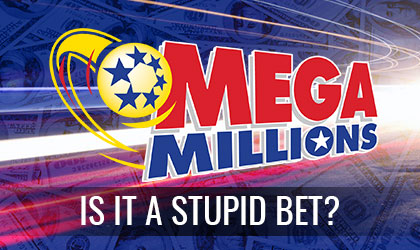
I also concluded that, even at the base jackpot amount, the opportunity to hit the sort of jackpot that is possible with the Mega Millions simply does not exist in a brick-and-mortar casino. I don't know where you put your, “Set for life,” number, but almost nothing in a casino gets me to my, “Set for life,” number...at least, nothing that only requires a $2.00 bet.
The Wizard himself considered rebutting my article, but there is simply no other way to turn one $2 bet into so much money whilst only making one bet. Even if the house would take a large enough bet for a player to run a Reverse Martingale, the player is still technically making separate and several bets (because the player could, and probably would, take the money and walk away) which come at a greater total expected loss if carried through. To be clear, starting with a $2 bet, the seventh step of a Reverse Martingale on Craps ($128 bet) has a greater expected loss by itself than does a Mega Millions ticket. That's not even including the six bets that were made before that.
Conclusion
My big takeaway from this record Mega Millions, and actual near-record, overall lottery jackpot is that habitual lottery players, even the millions of them who didn't hit it, should be happy that the winning ticket was sold in South Carolina. Why? Because it probably saved them a lot of money over the next few years, especially taken collectively.
If forty million dollars isn't enough, if one-hundred million dollars isn't enough, if half a billion isn't enough, if a billion isn't enough...what is? For some people, it takes a record, or at least something that can essentially be advertised as such. Had this near-record Mega Millions jackpot been missed, then a brand new and much higher bar would have been set. If that next drawing were to somehow miss, the implications are scary.
The lottery may well have come up with something bigger, “better,” and much more likely to reach what would have been the new record. More likely for them would mean one of two things: More costly for the player or less likely for the player.
Let's see how things go and maybe we'll be back again in about three months buying another ticket for the hype train. For most, it's a one-way ride to nowhere.
On This Page



